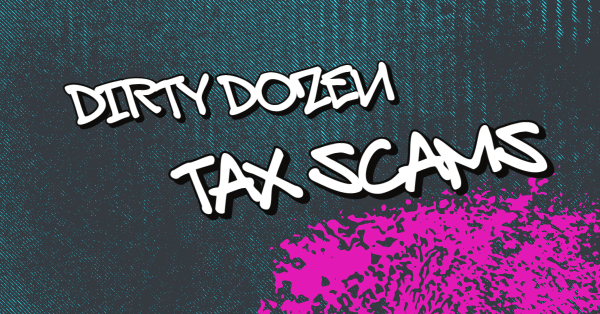DIRTY DOZEN TAX SCAMS

The Internal Revenue Service began its "Dirty Dozen" list for 2021 with a warning for taxpayers, tax professionals and financial institutions to be on the lookout for these 12 nefarious schemes and scams.
This year's "Dirty Dozen" will be separated into four separate categories:
- pandemic-related scams:
- Economic Impact Payment (EIP) theft
- Unemployment Benefits Fraud
- personal information cons:
- Phishing at all the possible personal info pools for tax and financial details including phishing to compromise tax professionals by obtaining their Electronic Filing Identification Numbers (EFIN) and Central Authorization File (CAF) numbers
- IRS impersonator phone calls and visiting
- Social media’s open scams book
- Ransomware
- ruses focusing on unsuspecting victims:
- Fake charities
- Seniors citizens
- Non-English speaking taxpayers
- schemes that persuade taxpayers into unscrupulous actions:
- Offer in Compromise mills
- Abusive tax break arrangements
- Ghost tax preparers and other unscrupulous tax return preparers
The agency compiled the list into these categories based on who perpetuates the schemes and who they impact. In addition to today's scams the IRS will highlight the other schemes over the next three days.
The IRS urges all taxpayers to be on guard, especially during the pandemic, not only for themselves, but also for other people in their lives.
"We continue to see scam artists use the pandemic to steal money and information from honest taxpayers in a time of crisis," said IRS Commissioner Chuck Rettig. "We provide this list to alert taxpayers about common scams that fraudsters use against their victims. At the IRS, we are dedicated to stopping these criminals, but it's up to all of us to remain vigilant to protect ourselves and our families."
The IRS' special online Taxpayer Guide to Identity Theft page has a variety of links for assistance. The IRS has more tax ID theft info and advice on its Identity Theft Victim Assistance: How It Works page and in the overview IRS Publication 5027, Identity Theft Information for Taxpayers. If you prefer calling, use the IRS ID Theft toll-free line at 1-800-908-4490.
The Federal Trade Commission's (FTC) general IdentityTheft.gov page also is a good resource. There you can report identity theft and get started on a recovery plan, such as placing a fraud alert with the three national credit reporting companies and closing accounts that you know, or suspect might be compromised.
Taxpayers are encouraged to review the "Dirty Dozen: list in a special section on IRS.gov and should be alert to these scams during tax filing season and throughout the year.




